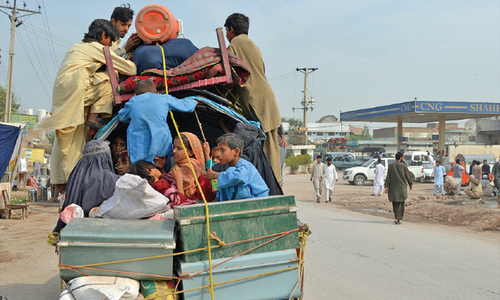
BUT why has it happened? They’re bellowing at Afghanistan, screaming blame and abuse.
But the louder they yell, the more insistent the question: how have they managed to get it so wrong?
Let’s talk about the boys a bit.
The wave, this fresh orgy of violence, is rooted in Afghanistan. There’s no real reason to doubt that.
The chaps claiming responsibility haven’t hid their general location and the boys, for all the dabbling in manipulation, tend to build their decisive tales around a kernel of truth.
But parse the story a bit.
There’s essentially two parts to it: the chaps behind the attacks are Afghan-based and they’re supported and facilitated by the Afghan state.
The first part is troubling enough. Afghan-based or Pak-based, the sweep of the violence necessarily suggests a network revived.
Culminating — or has it? — with the wretchedness at the shrine, the rat-a-tat of the violence necessarily implies failure.
One, yes; two, OK; three, maybe; four, why? The almost military precision of the strikes makes it worse — we didn’t know a wave was coming and we were powerless to stop it.
It’s the second part of the story though where things get really ugly.
Afghan-based and Afghan-coordinated — how in the hell did we miss that?
A bunch of determined militants can probably perform the marriage between suicide vest and bomber without necessarily getting detected.
This mess we’re in now, this business of having a rival in Kabul instead of an ally — we helped make it happen.
But they apparently get foreign-state assistance and facilitation, and our state couldn’t figure out what was on its way towards us?
The louder the yelling, the harsher the bellowing, you can guess there’s something else going on too. In the long war, among the many casualties, the truth may be the only repeat victim.
We missed a wave whose provenance we knew — if the boys weren’t thundering, and so visibly, on the warpath, awkward, uncomfortable questions would bubble to the surface.
Why is this happening now?
Just recently we were strutting around, smug that we are part of a new power troika on Afghanistan — us, the Russians and the Chinese.
A troika of pragmatists, unlike the Americans and the Afghan government, with their woolly ideas of peace and governance.
A clever tale, but with shaky foundations. The Ghani opening had once been real and it was eventually spurned by us. This mess we’re in now, this business of having a rival in Kabul instead of an ally — we helped make it happen.
There’s no good reason why we did it, why we didn’t seize what could have been a historic opportunity. No reason other than our inability to shut the door on the past.
The smugness abroad was complemented by a bungling at home.
The last stretch of Raheel and co was mired in uncertainty and then spilled into turmoil.
What was only whispered then is now an open secret: Raheel thought he had several good years left and didn’t want to go home.
An extension was wanted, but it was wanted in a way that fit the self-crafted legend of the chief: a selfless decision prompted by the government’s entreaties.
But Nawaz delayed and eventually demurred. The final weeks were chaotic.
From it emerged a new chief who had neither been groomed nor favoured by his predecessor. He has, though, benefited from a favour Raheel inadvertently did him: a delay in an expected late-term shuffle.
Out have been swept many from the Raheel era and in has come a new cohort, with several getting unexpected posts and promotions.
All of this to say, did the boys mess up because they were distracted?
A late-term chief and his team heavily invested in politics transitioning to a newly installed chief with a team that didn’t expect to be there — there’s much that could go wrong.
Like missing a wave of violence that the boys ought to have seen coming.
Maybe the raging against Afghanistan is genuine. But its utility is definitely suspect and its potential impact deeply problematic.
On utility, flip the perspective around: you’re sitting in Kabul and seeing the Pakistan beast roar after being prodded.
Bloody good, you’re thinking, it worked. We should try more of the same.
But you — with the Afghan perspective — are doing the prodding to achieve something; to get Pakistan to put pressure on the Afghan Taliban.
On that Pakistan isn’t budging. It’s part of this fancy new troika that’s exploring alternative scenarios on Afghanistan.
So it’s an impasse — again. Except now at an elevated level of conflict: Afghanistan prods us, we prod Afghanistan.
And we’ve just shown them that we can miss, in the boys’ own telling, a state-sponsored wave.
On impact, the Afghanistan, Afghanistan, Afghanistan raging is threatening to fracture the fragile public consensus against the militants.
Once again, militants are mere pawns of perfidious neighbours instead of an autonomous evil that threatens the nation from within.
Once again, the real problem is not the militants and their malignant agenda, but the nefarious lot backing them.
The unthinking fracturing of public consensus is being wrought at a particularly dangerous moment.
The militants waging war on us are evolving to a uniquely dire point for the country’s fault lines.
Kill an unfathomable number of kids and you’ll unite Pakistanis. That was APS.
Kill a bunch of Sufis, Shias and Christians and you’re probing deep into the wounds and unmentioned schisms that lace this land.
Yelling Afghanistan, Afghanistan, Afghanistan deflects blame. But it may also help open the very gates to hell.
The writer is a member of staff.
Twitter: @cyalm
Published in Dawn February 19th, 2017

















































